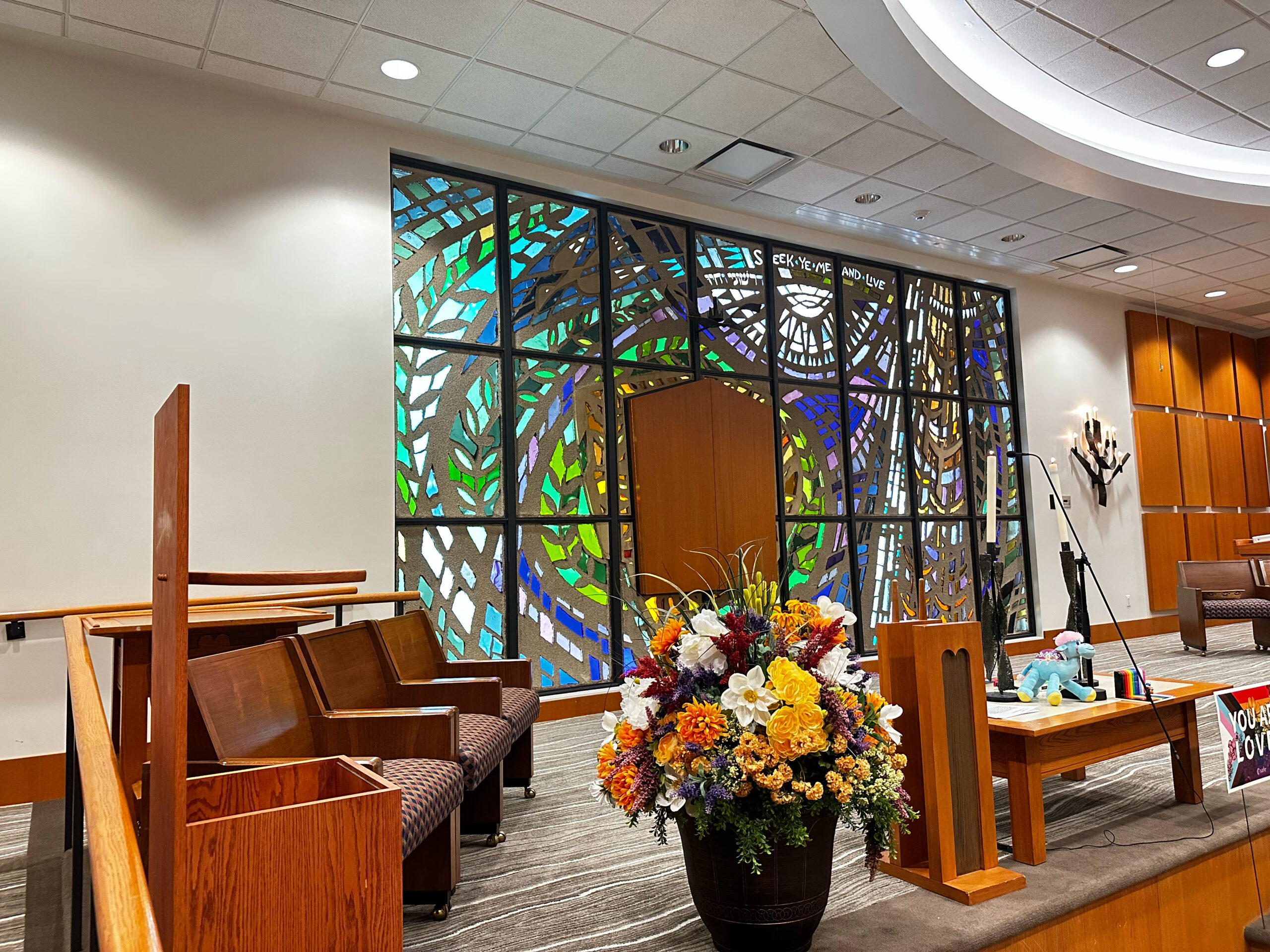
by Lauren Cohen | Oct 27, 2023 | Renewables, Solar, Solar for Good
On Friday, October 13, Temple Beth El, a progressive Reform synagogue located in Madison, set a remarkable example by installing a 102-kilowatt solar array. Full Spectrum Solar installed the array, which is expected to save the synagogue approximately $12,000 annually.
The array will offset 31.5% of their projected annual energy consumption, contributing significantly to their sustainability goals, which are aligned with aspects of their overall mission. For more than 84 years, Temple Beth El has remained dedicated to its vision to create and sustain a vibrant, inclusive, and engaged community that connects individuals from all walks of Reform Jewish.
Affiliated with the Union for Reform Judaism, Temple Beth is the sole Reform Jewish congregation in Madison, providing a welcoming haven for Jewish people to come together and fulfill their spiritual, educational, ethical, social, and emotional needs and expectations.
The decision to install solar panels was not one that was taken lightly. In 2018, the temple established a task force to review investment priorities for its 75-year-old building. Recognizing that their roof offered an ideal space for solar panels, they made necessary improvements to support the longevity of the installation. This solar initiative serves two crucial goals for their community: reducing their carbon footprint and reliance on fossil fuels and lowering their energy costs.
The success of this solar initiative was made possible through multiple funding sources. Temple Beth El was a grant recipient of the Solar for Good program, which supplied them with half of the solar panels required for the project. Additional financial assistance came from the Goodman Foundation, which helped offset the costs of the remaining solar panels. With the passage of the Inflation Reduction Act’s Elective Pay provision, the temple will receive a 30% refund from the federal government, significantly reducing the overall project cost.
The completion of Temple Beth El’s solar array is a testament to their commitment to both environmental sustainability and fiscal responsibility. By harnessing the power of the sun, they are taking strides to reduce their carbon footprint and inspire their community to follow suit. This initiative not only aligns with their vision of inclusivity but also paves the way for a greener and more energy-efficient future.
Temple Beth El’s solar journey serves as a reminder of the importance of collective action to electrify Wisconsin’s energy mix and transition away from fossil fuels. With its newly installed solar array, the organization has not only reduced its carbon footprint but also set a compelling example for others to follow.
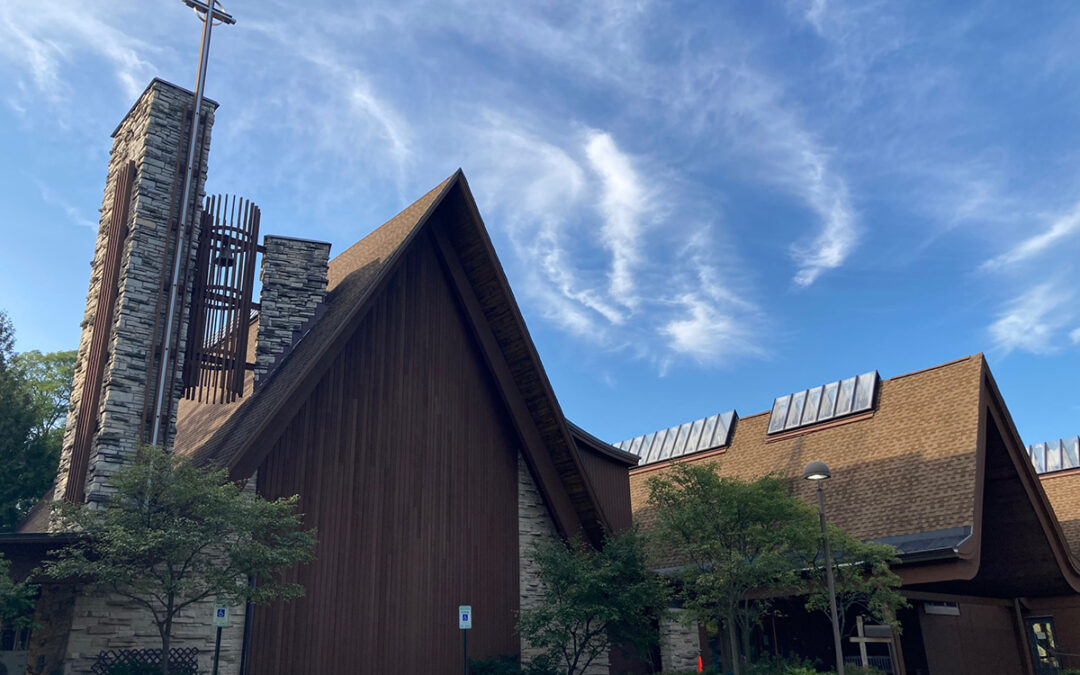
by Lauren Cohen | Sep 28, 2023 | Renewables, Solar, Solar for Good
Located in Madison, Wisconsin, St. Dunstan’s Episcopal Church, founded in 1958, has embarked on a notable journey towards sustainability and environmental responsibility. This warm and inclusive congregation, comprising approximately 200 households, places a strong emphasis on creation care, welcome for all, and the full inclusion of LGBTQIA+ individuals. Their recent venture into renewable energy underscores their commitment to their faith and environmental stewardship.
St. Dunstan’s has long been aware of its carbon footprint. In 2016, the church established a Creation Care mission statement, outlining its commitment to nurturing a reverence for the natural world, reducing its ecological impact, and broadening its involvement in environmental initiatives. To this end, the church had previously sourced all its energy through MGE’s shared solar and green energy programs. However, with mounting concerns about climate change, the congregation sought to take more direct action.
In the fall of 2022, St. Dunstan’s Episcopal Church received a grant from RENEW Wisconsin’s Solar for Good program. This initiative supports nonprofits in the state in installing solar arrays, marking the inception of an ambitious effort to generate renewable energy on-site. This decision aligned with the church’s pre-existing commitment to environmental stewardship.
The resulting 29.7-kilowatt solar array, installed by Full Spectrum Solar, consists of 55 panels and is anticipated to offset 75 percent of their estimated annual energy consumption.
Financial backing for the project was a collaborative effort. St. Dunstan’s secured a generous gift from a donor, further complemented by pledges from congregation members and friends. Additional financial support was provided through grants and incentives, including the MadiSUN Backyard Solar grant and Focus on Energy support. Enthusiasm surrounding the project sparked additional donations from congregation members.
Beyond achieving self-sufficiency through energy generation, St. Dunstan’s remains firmly committed to community service and outreach. The solar project aligns harmoniously with their mission of social justice and community support. As energy costs rise and budgetary pressures mount, the solar project is anticipated to alleviate some of these financial burdens, enabling the church to reallocate funds back into its mission.
In the summer of 2023, St. Dunstan’s hosted a solar dedication event. This event served as an opportunity to celebrate and promote their 29.7-kilowatt solar array to their congregation and the wider community. It included information sessions on the economic and environmental benefits of solar energy, as well as details regarding financial incentives for installing a solar system.
St. Dunstan’s Episcopal Church’s commitment to renewable energy is a shining example of how faith-based organizations can lead by example in environmental stewardship while simultaneously nurturing a sense of community, social justice, and environmental consciousness. Their dedication to their values and the environment serves as a compelling illustration of the positive impact such initiatives can have on local communities and the broader world.
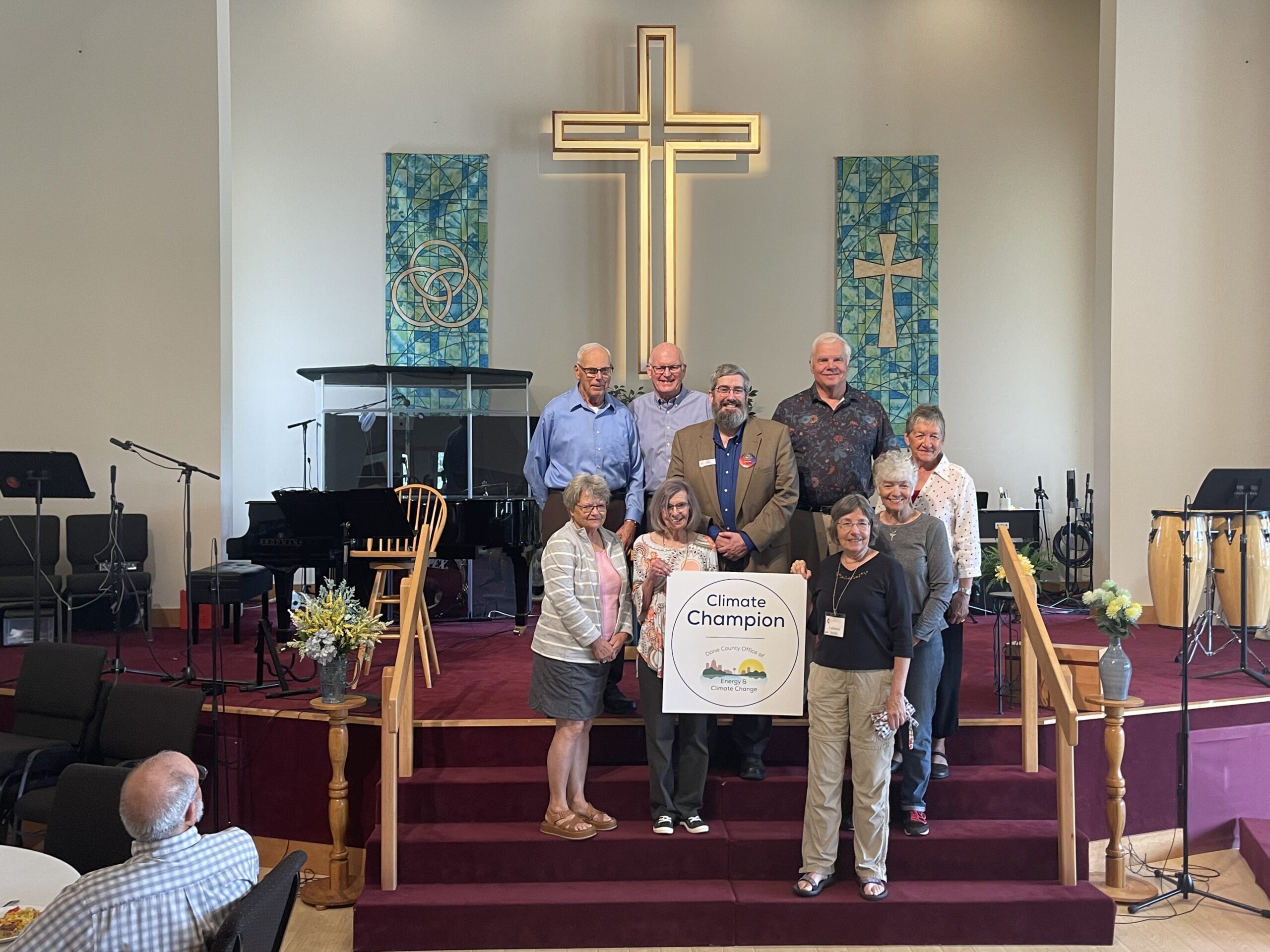
by Lauren Cohen | Sep 28, 2023 | Renewables, Solar, Solar for Good
On Sunday, September 24, People’s United Methodist Church (PUMC) hosted a dedication ceremony to celebrate the completion of its solar array. The solar project is substantial, with an installed capacity of 70.3 kW, poised to offset approximately 64 percent of the church’s power consumption. In addition, a 7.56-kW installation at the church house is expected to generate 10,000 kWh annually, covering 94 percent of its current power usage.
PUMC’s commitment to sustainability extends beyond solar installations. They were named a 2023 Climate Champion by the Dane County Office of Energy and Climate Change for their consistent efforts.
“Climate justice is social justice, and our commitment will do more for people worldwide than almost any other effort we can support at this time,” said representatives from the church. “Together, we are doing a powerful ministry for our world today and for future generations.”
Funding for this solar project was secured from various sources, including a grant from Solar for Good, financial support from Focus on Energy, and a 30% elective pay from the federal government under the Inflation Reduction Act. A vital component of their fundraising efforts was a capital campaign, fortified by a pledge from an internal donor.
Established in 1845, PUMC has been a steadfast presence in their community. PUMC is a Christian community of faith open to all people, focused on issues such as racial inequality, food security, and environmental justice.
PUMC’s journey in environmental stewardship began with small-scale initiatives; however, their ambitions for sustainability expanded in 2019 when they initiated plans for a solar installation. Unfortunately, the COVID-19 pandemic introduced logistical challenges and financial uncertainties that momentarily halted progress.
Nevertheless, their objective remained unchanged — commit to environmental stewardship and reduce their carbon footprint. They also sought to enhance community engagement by participating in the Midwest Solar group buy program for Dane County in the spring of 2023 as part of their solar project.
“Midwest Solar Power was happy to work with the Peoples United Methodist Church and Solar For Good to bring solar to the church and parsonage,” said Alarik Roselund, Partner and Co-founder of Midwest Solar Power. Established in 2009, Midwest Solar Power is a Madison-based solar installation company dedicated to providing specialized and high-quality work to its clients.
Other notable works include participating in a Solar group buy, implementing recycling initiatives, hosting an annual Green Fair, and exploring the possibility of adding heat pumps for the church office and preschool.
PUMC’s solar project goes beyond a technological upgrade; it exemplifies its commitment to environmental preservation and carbon footprint reduction. This effort guarantees not only long-term reductions in utility costs but also allocates substantial financial resources that can be redirected toward their other critical social justice initiatives. PUMC’s journey toward environmental stewardship stands as a compelling example for other nonprofit organizations and community groups, showing how sustainable practices can foster positive change.
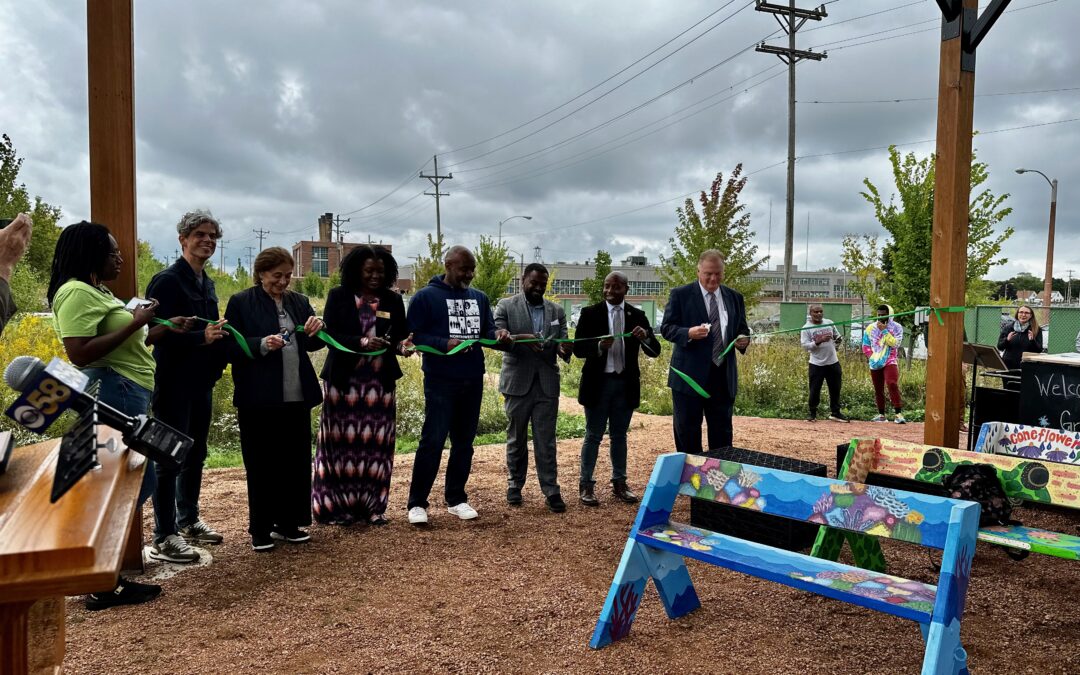
by Lauren Cohen | Sep 28, 2023 | Renewables, Solar for Good
On Thursday, September 28, the Northwest Side Community Development Corporation (NWSCDC) celebrated the completion of their 8.88-kilowatt solar system at their Green Tech Station Facility. The solar installation on this site represents a pivotal step forward for the former brownfield site.
Green Tech Station’s significance lies not only in its solar capabilities but also in its role as an outdoor environmental education destination. This site has been thoughtfully designed to attract hundreds of visitors each year, catering to individuals of all ages.
NWSCDC, a nonprofit community development organization established in 1983, operates across multiple program areas with the goal of supporting neighborhood stability and economic growth.
“The solar electric generation at Green Tech Station will offset our energy use at the site and allows us to expand the environmental education and green technology features for learning and observation,” said Andrew Haug, Senior Development Manager at NWSCDC. “Students, community groups, and researchers will benefit by seeing renewable energy working together with stormwater management.”
The journey from a remediated brownfield to an outdoor education hub is remarkable. The site boasts a host of features, including bioswales, an underground stormwater cistern, over 465 newly planted trees, the restoration of native prairie, and the creation of a constructed wetland. These elements collectively provide a tangible opportunity for visitors to witness sustainable practices and green technologies in action.
An outdoor pavilion, completed in late 2021, serves as the educational focal point of Green Tech Station. As NWSCDC highlights its solar array, visitors can expect both an educational experience and a practical demonstration of renewable energy.
The system, installed by Full Spectrum Solar, is projected to offset more than 100% of their electrical use, with the excess energy being channeled back into the grid, creating savings that will be reinvested into programming and maintenance at Green Tech Station.
NWSCDC’s solar array signifies a significant step toward sustainability and stands as a symbol of progress and education within the Milwaukee community. This solar installation’s capacity to generate clean energy showcases the potential of renewable technology.
The installation powers the facility and serves as a lesson on the benefits of embracing renewable energy solutions. As hundreds of visitors, young and old, explore Green Tech Station, they are offered a tangible opportunity to witness firsthand how renewable energy and environmental stewardship can coexist.
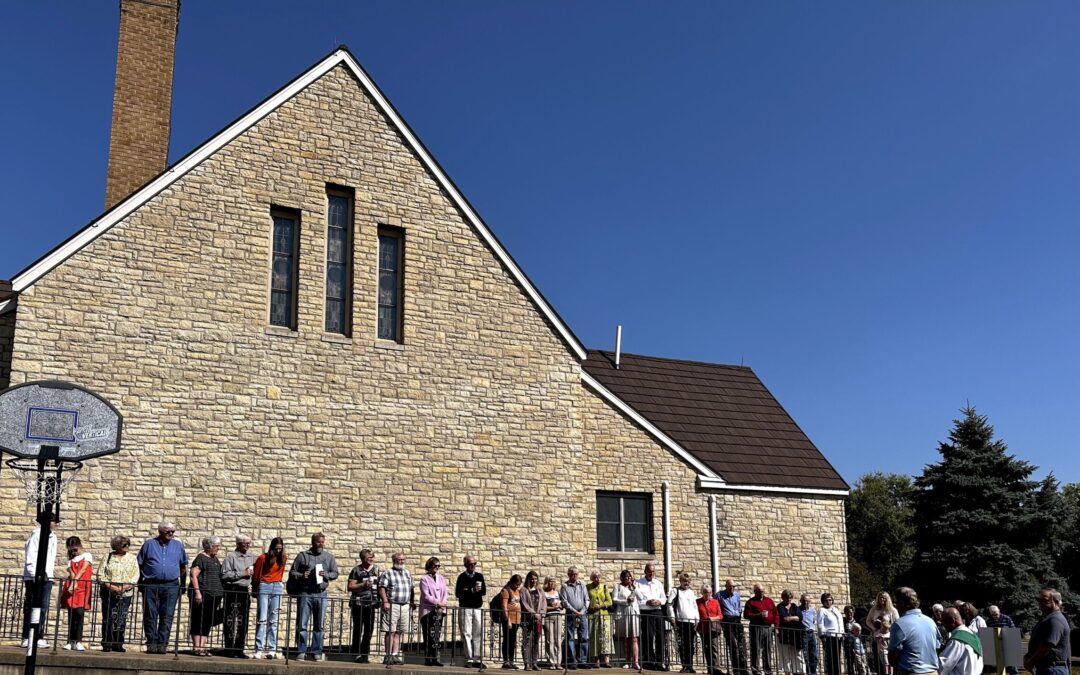
by Lauren Cohen | Sep 19, 2023 | Solar, Solar for Good
On Sunday, September 17, Peace Lutheran of Pigeon Falls hosted a solar dedication ceremony to celebrate their new solar array. The 44.3-kilowatt array was installed by Ethos Green Power and is expected to produce 61,000 kilowatt hours of energy annually.
Peace Lutheran of Pigeon Falls is a congregation of the Evangelical Lutheran Church in America and has served the community for over 150 years. The installation will help the church with reducing its reliance on conventional energy sources, ultimately saving on energy costs.
The journey to embrace solar was a collective endeavor, made possible through dedicated support and funding. Notably, Peace Lutheran of Pigeon Falls received funding from Focus on Energy, Solar for Good, Ethos Green Power, and individual donations from its congregation.
The commitment to this initiative would not have been possible without the support of its congregation members, whose dedication to environmental stewardship and care for creation played a pivotal role.
“Our new solar array is a testament to our ongoing dedication to caring for God’s creation,” said John Skoug, Member of Church Council and Creation Care Team Lead. “This project, in conjunction with our geothermal heating and cooling system, signifies two major steps our church has taken to reduce our environmental impact while simultaneously saving on energy costs.”
Peace Lutheran has undertaken a series of green initiatives. In addition to its solar array, the church has embraced geothermal heating and cooling, upgraded to energy-efficient LED lighting, and implemented a recycling program.
As Peace Lutheran of Pigeon Falls celebrates the completion of their solar project, they stand not only as an example of environmental stewardship within their community but as a model for churches throughout Wisconsin. They have shown that renewable energy is not only an environmentally conscious, but a smart financial decision.
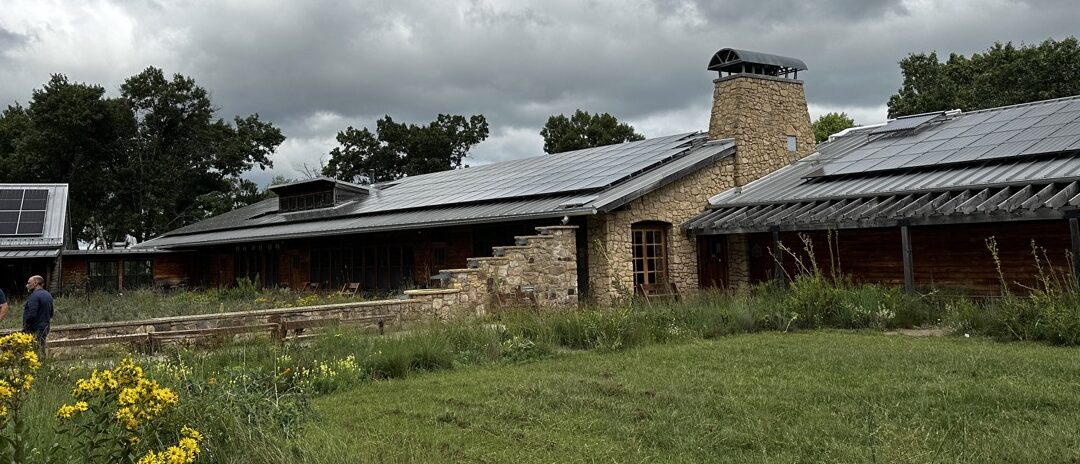
by Lauren Cohen | Aug 29, 2023 | Solar, Solar for Good, Sustainability
On Saturday, August 26, The Aldo Leopold Foundation Legacy Center celebrated the completion of its newest solar array. Since the conception of the Legacy Center, the Foundation has aimed to achieve what Aldo described as, “The oldest task in human history: to live on a piece of land without spoiling it.”
The Aldo Leopold Foundation is a nonprofit conservation organization with a mission of fostering a land ethic through the legacy of Aldo Leopold. As described by him, the land ethic involves recognizing ourselves as “plain members and citizens” of the land community and treating our fellow members with care and respect.
The Foundation’s dedication to the land ethic is underscored by its new 90-kilowatt solar installation completed by All Sky Energy. This is the Foundation’s second solar installation at the Aldo Leopold Legacy Center, boosting the organization’s goal of achieving net-zero. As a complement to the new solar array, the foundation has also installed three electric vehicle charging stations and added two electric trucks to its fleet.
This project was made possible through the collaborative efforts of All Sky Energy, The Couillard Solar Foundation, OneEnergy Renewables, RENEW Wisconsin, and the Wisconsin Public Service Commission. The main source of funding came from a $152,000 Office of Energy Innovation grant and panel grants from OneEnergy Renewables and Solar for Good.
Buddy Huffaker, President and Executive Director of the Aldo Leopold Foundation, highlighted the significance of this endeavor, stating, “Obviously, this project benefits the Leopold Foundation by reducing our expenses, but we are most excited about the opportunity to continue demonstrating a conservation ethic that informs and inspires others to transition to renewable energy and electrification.”
This initiative resonates deeply with Aldo Leopold’s philosophy of living harmoniously with the land. The Aldo Leopold Foundation aims to lead by example by showcasing how investments in renewable energy promote sustainability while creating a tangible connection between modern living and the land ethic Leopold championed.
With thousands of annual visitors to the Legacy Center, the Aldo Leopold Foundation serves as an example for the broader community. This latest effort to electrify the land ethic has the potential to inspire others to embrace renewable energy solutions and drive rural electrification enhancements.






